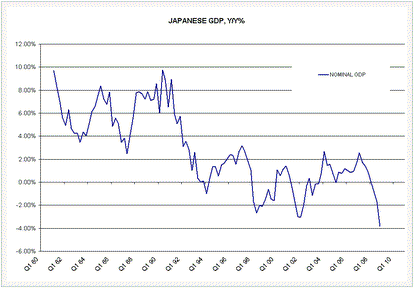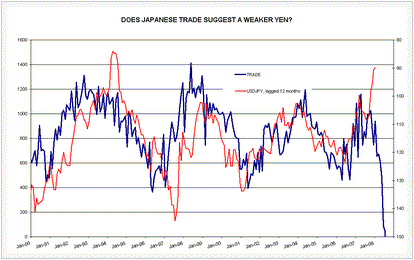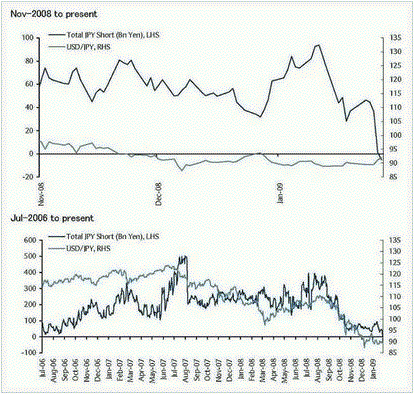Working from home, as Macro Man is doing in the aftermath of his injury, presents a unique set of challenges. While he remains in contact with his colleagues, counterparties, and contacts on a real-time basis (thanks to the miracle of modern technology), it is still all-too-easy to feel out of the loop, especially when it come to the give-and-take of the quotidian on-the-desk banter.
Still, there are some benefits to working in relative isolation. It certainly allows for introspection and a contemplative mien that is difficult to achieve on a trading desk. For example, Macro Man has discovered which song he has listened to more than any other on iTunes (Bohemian Like You, 105 times). That’s information that he just couldn’t get in the office, no matter how hard he tried. (As you can probably tell, Macro Man is attempting to accentuate the positives of his injury.)
Macro Man has also found his thoughts straying to Japan in recent days. It’s been a while since he has written about Nippon, largely because the country has sunk swiftly into irrelevance, a mere side show when compared to the financial crisis Big Top. The yen has rallied sharply over the past year, not because of any particular merit of Japan, but largely because the rest of the world is turning Japanese (no growth, rising savings, and zero interest rates.)
And yet….Japan is managing to to re-insert itself into the global market debate through sheer force of economic decrepitude. Much like the Asian nations profiled yesterday, Japan’s economic trajectory stinks. As noted in the comments section yesterday, Q4 real GDP in Japan shrunk by a resounding 12.7% q/q annualized. That’s the stuff of depressions. Indeed, y/y nominal GDP in Japan (Macro Man tends to focus on nominal GDP given the distortions caused by Japan’s GDP deflator) has sunk below the depths plumbed during the Lost Decade, the nadir which effected the rise of the reforming Junichiro Koizumi.
Morgan Stanley’s Stephen Jen articulated an interesting concept a few years ago with respect to the JPY, citing the “economic equilibrium” level and the “capital account equilibrium” level. For most of Macro Man’s career, the former has been well below the latter, as Japan has run a tasty current account surplus while exporting zillions of yen worth of capital. On the rare occasions where the two equilibria have aligned, as in 94-95, the moves in the yen have been explosive.
Perversely, however, as the rest of the world has turned Japanese, the directional bias of the two equilibira has flipped-flopped. Even as Mrs. Watanabe and her institutional brethren have brought money home in droves, thereby lowering the USD/JPY capital account equilibrium exchange rate, Japan itself has “turned American”, if you will, and its once-impervious external surplus has withered into deficit.
As a result, the economic equilibrium USD/JPY has drifted well north of current levels. How far north is open for debate, but the chart below shows a simple overlay of the leading relationship between Japan’s trade balance and the yen. On this basis, the economic equilibrium level for USD/JPY would appear to be literally off the charts- to the topside.
Now, Macro Man isn’t suggesting that USD/JPY is going to 150 in short order, if at all. Yet the trend in Japan’s external surplus is a legitimate one, and Macro Man has heard some rumblings that Japanese exporters are over-hedged. If that’s the case, then we could probably expect them to become net buyers of USD (and other currencies) and sellers of yen into fiscal year end.
At the same time, Mrs. Watanabe now finds herself long yen…at multi-year trade-weighted highs, naturally. While Macro Man doesn’t expect a return to the care-free carry-trading days of yesteryear, it wouldn ‘t come as much of a shock for Japanese retail to swing back to shorting the yen, especially if some interesting chart points are broken.
Image: Barcap
So despite the ongoing travails of equities generally and the financials in particular, Macro Man is sensing a growing desire amongst Japanese and gaijin punters alike to have a go at selling the yen. Critically, positioning is skewed the other way, with market positioning embedded long yen.
Perhaps the last word on the subject should come from Japan’s (former) finance minister, Shoichi Nakagawa. Say what you will about Paulson, Geithner, Steinbrueck, and Darling (and Macro Man has said plenty!)….at least none of them were driven to the bottle.





Leave a Reply